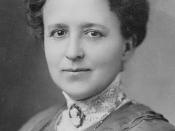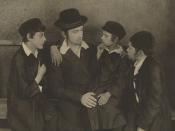A juvenile, or minor, is defined as any person under the age of 18 in the juvenile justice system. (Jacobs, 2003) This is someone who is not an adult and is not eligible to vote or buy alcohol, tobacco, or firearms. They can't buy a home, enter adult-only clubs, or get married. Yet, on occasion, when they commit a crime, they can be eligible to be tried as an adult in the criminal justice system. How can we charge a juvenile as an adult when we establish an age limit for everything else? Is it fair for one person of seventeen to be tried in a juvenile court, receiving a lesser sentence for murder than an individual just six months older who committed the same crime? Probably not, but this and may other situations are the cause for much controversy and angst in America today. There are many reasons behind such judgments that you may or may not agree with.
Juvenile crime is stated as "an act committed by a minor that would be considered a crime committed by an adult, such as vandalism, burglary, assault, or murder." (Silverstein, 1997) Juvenile crime can be dated bas as far as the 1600's, where "in the Massachusetts colony, a teenager over sixteen years of age who had cursed at or hit his parents could receive the death penalty." (Landau, 1990) In the 1880's, many young immigrants were faced with cultural differences that led them to commit crime. Their families were starving and therefore stealing was the major crime. (Landau, 1990)"There is no national juvenile justice system in the United States." (Landau, 1990) Each state's laws on juveniles vary. Our legal system has two different court systems. Juvenile court is where a lot of cases are heard on custody battles, child support...


